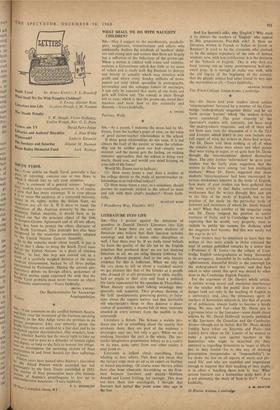LITERATURE INTO LIFE
SIR,—May I protest against the delusions of grandeur in Donald Davie's Literature into Life article? I hope there arc not many students of literature who believe that their function includes sociology and half a dozen other disciplines as well. I fear there may be. If we study street ballads 'to learn the quality of the life led by the English populace that produced them' we are not studying literature at all, we are using literary evidence for a quite different purpose; And to use only literary evidence for this is ludicrous. When we rely on the arts alone to tell us about a vanished society wc get pictures like that of the Greeks as a people who dressed (if at all) permanently in white marble, had no pupils to their eyes and lived a political life fairly represented by the speeches in Thucydides. When literary critics start talking sociology they , generally talk nonsense. They produce theories of the 'folk' spontaneously generating poetry; or fairy- tales about the organic society and that inevitable old wheelwright's shop; or they discover a disso- ciation of sensibility, a second fall of man, variously situated in every century from the twelfth to the nineteenth.
Literature is fiction. The fictions a society pro- duces can tell us something about the society that produces them; they are part of the evidence a sociologist may use; but only a part. • While we are studying literature the part is the whole. The par- ticular imaginative presentation before us is a reality on its own, quite apart from any -other reality it may point to.
Literature is indeed about everything, from whaling to love affairs. This does not mean that the literary critic must set up as an expert on blubber or sexual psychology. Of course some literary critics have also done admirable skirmishing on the fron- tiers between literature and society—Matthew Arnold and Lionel Trilling, for example. This does • not turn them into sociologists. I thought that Socrates had settled this point some time ago in the Ion.
And for heaven's sake, why 'English'? Why must it be always the teachers of 'English' who appear in this preposterous Poo-Bah role? Is there no literature written in French or Italian or Greek or Russian? It used to be the classicists who claimed to be the unique repository of the sotn of human wisdom; now, with less justification, it is the denizens of the 'Schools of English.' This is why they arc busy turning out so many presumptuous half-edu- cated prigs. It is enough to make one wish, with the old fogeys of the beginning of the century, that the ghastly subject had never found its way into the universities at all—Yours faithfully.
GRAMM HOUGH
The White Cottage, Grantchester, Cambridge


































 Previous page
Previous page